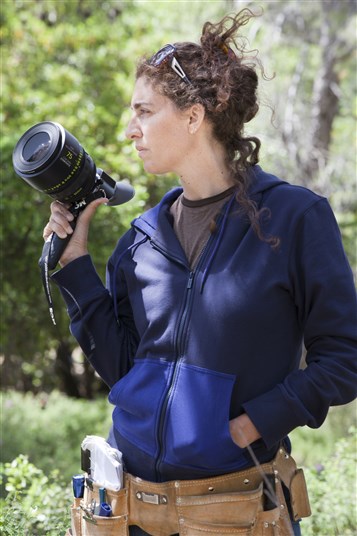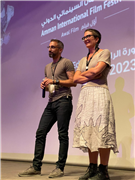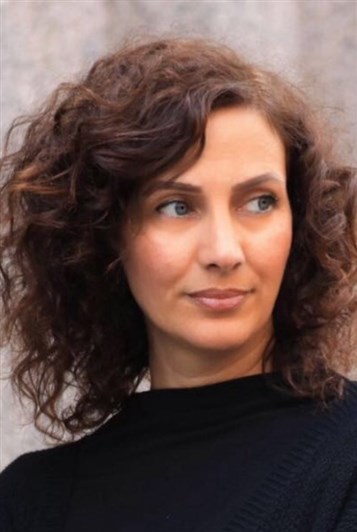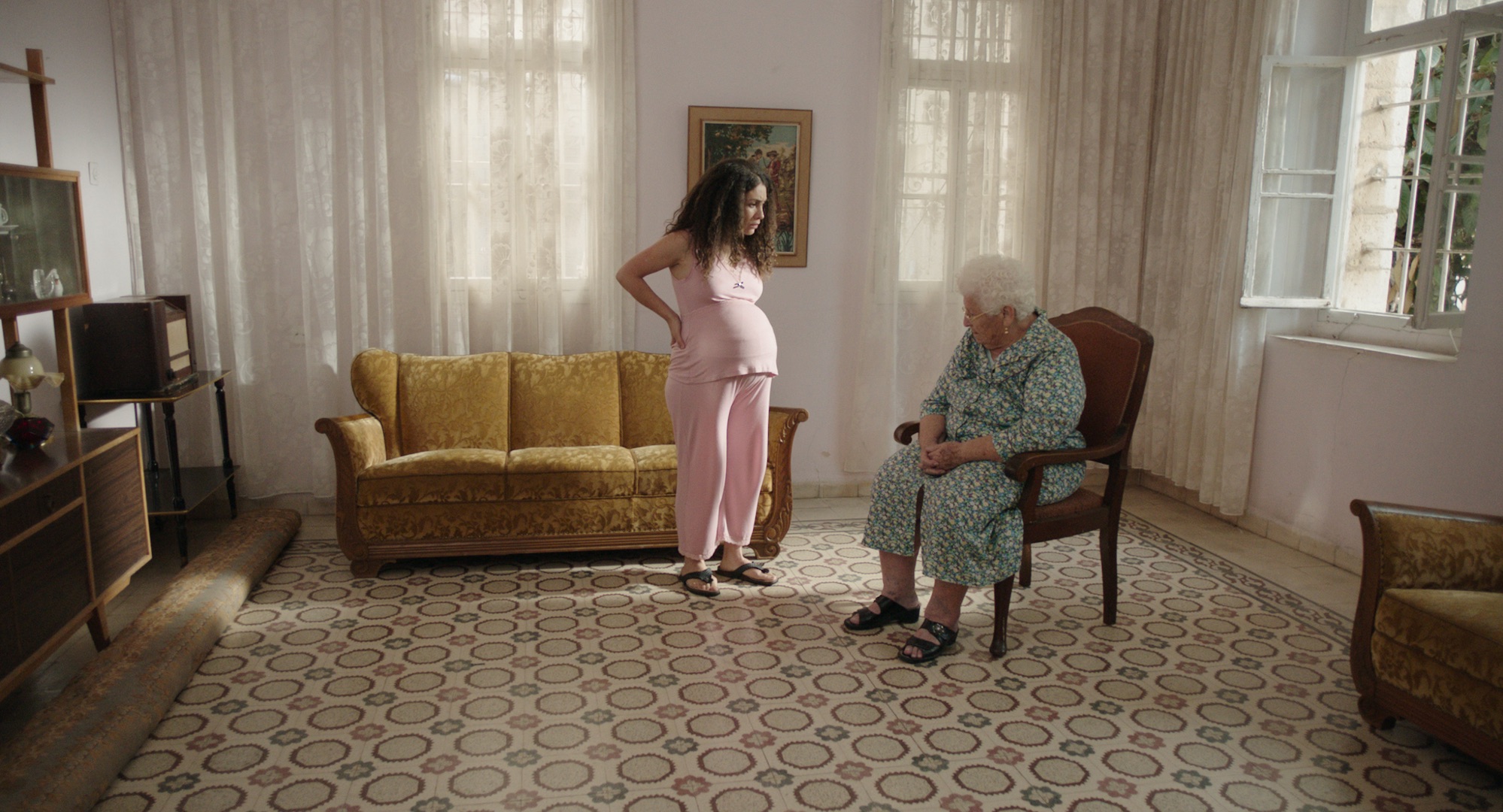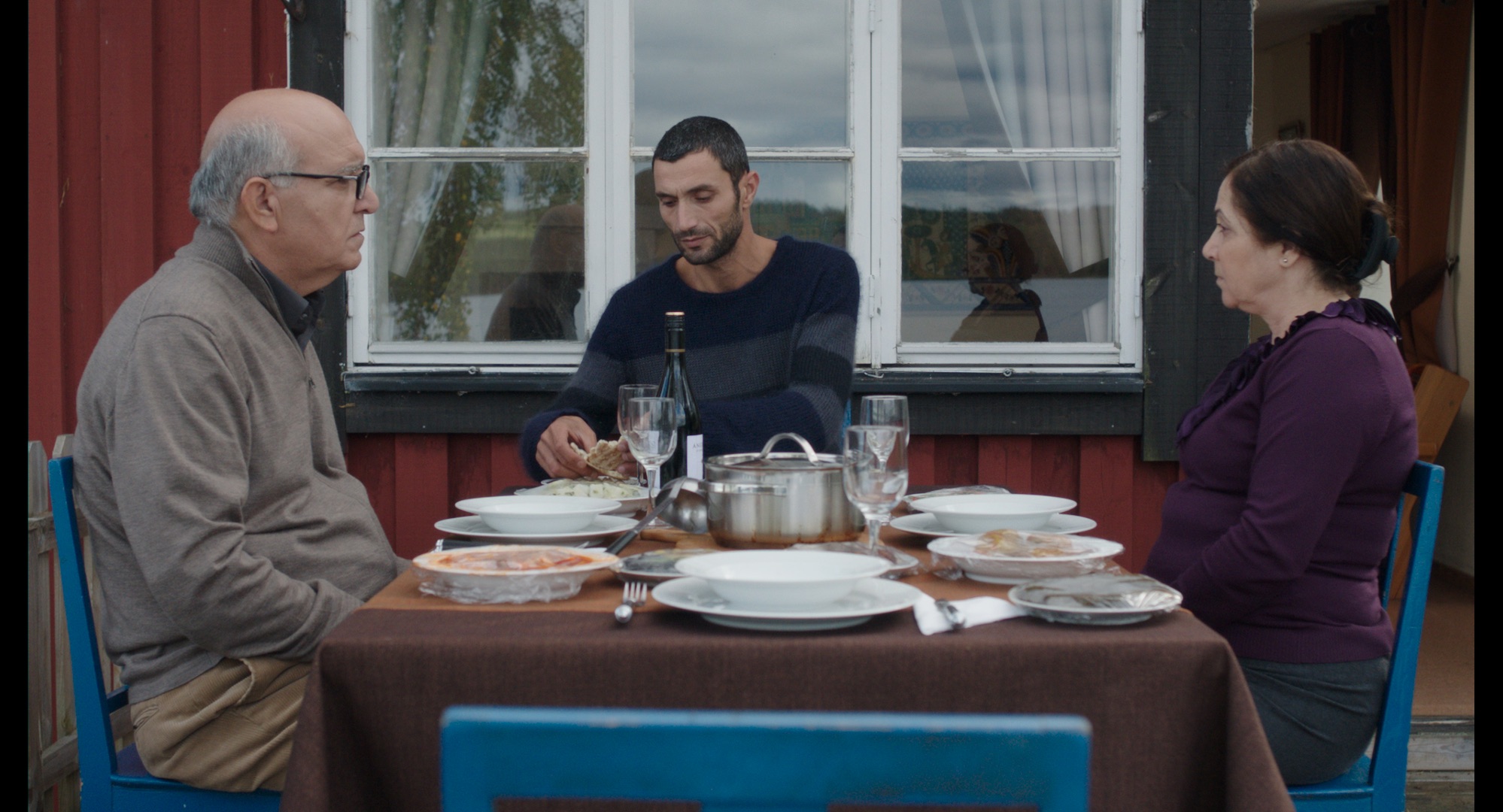This interview was conducted with Annemarie Jacir following the release of her recent film Wajib (2017).
Isis Nusair (IN): How did you start making movies?
Annemarie Jacir (AMJ): When I graduated from university, I moved to Los Angeles and rented a room with a friend and began to work as a production assistant and doing whatever jobs I managed to find. I was interested in cinema but did not know yet what I wanted to do or what I could do. I also learned how to edit from a friend and began playing with images and shooting my own experimental films.
IN: Your film Like Twenty Impossibles (2003) deals with the Israeli occupation. What presence does the Israeli occupation have in your films, and how does it shape the relation to Palestine?
AMJ: Like Twenty Impossibles is about many things, including the responsibility one has as an artist and different positions of power. The idea for the film was also about our reality as Palestinians as a people under occupation and specifically how the Oslo years were, for most of us, another political mechanism to keep us separated from each other as Palestinians. One theme in almost all my films is refusing this separation.
IN: All of your films have focused on Palestine while examining different periods, communities, and locations. Why is it important for you to do so?
AMJ: It is what it is. I focus on what I know, what I want to know more about, and on what moves me.
IN: In When I Saw You (2012) you focus on Palestinian refugees and resistance (the emergence of the Fidayeen movement). What connection do you see between the two, and how does that relation unfold in the movie?
AMJ: They are absolutely interlinked. When I Saw You takes place during a very important moment in our history. Young people decided to join together to resist together. They also decided that even though they had been victimized, they were not going to be victims anymore. They refused to be victims. These young women and men formed the resistance. What they wanted was in fact very simple—to be able to go back to their homes, and to live as free human beings. When writing the story, the character of Tarek was another way to visualize this feeling in parallel. When I Saw You is a coming of age story not only of a boy but also of his mother, and of a people.

Jacir working on a scene from When I Saw You

Ruba Blal and Annemarie Jacir working on a scene from When I Saw You

Mahmoud Asfa in When I Saw You
IN: In both Salt of This Sea (2007) and Wajib (2017) you examine different relations to Palestine where people are either leaving or coming back. What connection are you trying to make between Palestinians in the diaspora and those in the 1948 and 1967 areas?
AMJ: Palestinians are one. Each individual has their own experience, their own story. I do not believe there is a difference between those in 1948 and those in 1967, between refugees and those here in Palestine, many of whom are refugees as well.

Suheir Hammad, Saleh Bakri, and Annemarie Jacir at Cannes Film Festival
IN: You yourself have lived throughout the years in between these different spaces. How does this shape your relation to Palestine and the making of your films?
AMJ: Palestine has been the only constant in my life. I have spent my life between many cities, living in different places, and most are places I never returned to again. People and faces I never saw again. Palestine is the only place I have known my entire life, and my relationship with it has shaped me as a person, and as a filmmaker.
IN: Soraya (Suheir Hammad) in Salt of This Sea (2007) came from Brooklyn to Palestine. Why did she come back and what was she trying to achieve?
AMJ: She comes back to the place she comes from. She acts on the dream of every Palestinian refugee—to be able to return to the place we were displaced from. Because she has an American passport, she is able to do that—unlike her grandparents and her parents who never were able to return. A document allows her to, so she comes back. A third-generation refugee, a people who still to this day are not allowed to return. Salt of this Sea is like a fantasy. What if we could return? What would we do? What if we could go into our former homes, now occupied? What if we could walk right into the very bank that froze our family assets? What if we could spend the night in the villages that were demolished, in whatever remaining house we found?
IN: Wajib is like a road movie that moves quickly in one day in Nazareth between different characters and segments of society. Why was it important for you to use this style?
Palestinians are one. Each individual has their own experience, their own story. I do not believe there is a difference between those in 1948 and those in 1967, between refugees and those here in Palestine, many of whom are refugees as well.
AMJ: For me, it was a way to frame the story to allow me to explore the father and son relationship and also life in Nazareth, how a community interacts, and how its members perform in front of each other and in private. Everyone has their notion of wajib, of tradition. The delivering of wedding invitations in Palestine, occupied seventy years ago and where the majority of its inhabitants became refugees, is important. You have a town like Nazareth, the largest Palestinian town in historic Palestine, where the remaining residents were forced to carry Israeli IDs—and they hold on so strongly to this tradition of hand delivering wedding invitations no matter what. I believe it is about holding onto one’s identity and all the contradictions that come with it.
I loved the idea of putting two people in a car where they are forced to confront each other, forced to speak to each other without escape, almost like a prison. Yes, there is history in everything. The old Volvo, full of memories, which was their car when they were a family, is the only thing Abu Shadi has left of it.
The car allowed me to tell the story of the two characters as they are when they are alone together in the vehicle, and as they move from house to house and “perform” something else in front of the community or when they are in public.
I also liked the challenge of structuring the film to take place in one day. Wajib is my most dialogue-heavy film—the structure and the story is all built on dialogue. However, what I am most interested in are the things they do not say to each other and have never said to each other.
IN: Why was it important to focus on this particular family in the movie?
AMJ: The film is about Palestinians in Nazareth and the characters are both Christian and Muslim. Like Nazareth of course, a city which is seventy percent Muslim and thirty percent Christian, a mixed city. Shadi and Abu Shadi are secular people, but you see some of their family members are Christian. Shadi’s mother was Muslim. They visit several Muslim homes in the film. I wanted to paint a picture of this mixed city, not just in terms of religion but also, and much more importantly, in terms of class.
IN: Wajib contains an interesting generational dialogue between the two main characters in the film. What is the film trying to say about the relation between the past and the present, the social and the political?
AMJ: The social and the political cannot be separated. Essentially Shadi and Abu Shadi feel the same anger, but they have chosen to deal with it and express it in different ways. The film follows the story of these two men, carrying out a masculine tradition of delivering invitations. This leaves the women performing other traditions. Or not, as in the case of Shadi's mother. Women are both at the forefront and on the margins in this story, always present. Sometimes part of keeping up faces and traditions, and sometimes breaking all boundaries. Shadi's mother—who is absent—is, in fact, the most present in the film. She is in every single scene, a presence between them.
IN: The Israeli state is also present yet absent in Wajib. How are the main characters negotiating their relation to that state?
AMJ: Abu Shadi is a schoolteacher in a system that is very carefully monitored, and he has learned to step carefully and cautiously. The Palestinian schools inside Israel are surveilled very closely by the Israeli authorities and there are subjects and ideas that they are forbidden to speak about or even mention, like our history, the Nakba, what happened to us in 1948, and what is still happening right now. In fact the Israeli state has a system to hire people whose job title is literally called “the inspectors of knowledge” and who monitor and report everything happening in Arab schools to the Israeli Ministry of Education.
When I developed the character of Shadi, I imagined him a normal teenager with a rebellious side. As most teenagers, there came a point where he began to ask questions about the power imbalance and racism he saw around him. In a place where people are silenced for being critical of these kinds of policies, those questions put him in danger and his father decided to send him abroad. Shadi never wanted to leave. I imagined him as a teenager who also felt he could fight injustice and make a change. Someone with rage and also with great hope. He was not involved in political parties but rather he was growing into an awareness and political consciousness, which thus connected him with the rest of the world. This made him a threat to the Israeli state and Abu Shadi, a man who lived through the martial law of 1949-1966 when Israel placed all Palestinian citizens living inside what had become the state of Israel under harsh repression. This is very important to know about him and why his character is the way it is, still recalls daily life during that time of curfews, administrative detentions, and expulsions for Palestinians living inside. He learned that, in order to survive, he had to be compliant, subservient.

Mohammed Bakri and Saleh Bakri in Wajib
IN: The city of Nazareth also plays a role in the film.
AMJ: The city of Nazareth itself is a character: a city occupied seventy years ago. Today people are living on top of each other, and there is a lot of frustration. The people of Nazareth do not have full rights as citizens and deal with daily discrimination in their jobs, in work, in schools, in municipal services, in everything. I feel a lot of tension in Nazareth. For me, this aggression is something that will eventually explode, as it has in the past and it will again. Even if some people’s survival mechanism is apathy, eventually the tension will lead elsewhere. People can only function so long with a boot on their neck.
IN: Does it make a difference being a woman filmmaker? Is there a Palestinian women's cinema?
AMJ: I do not believe in women's cinema.
IN: In addition to making movies, you also write poetry? What themes do you depict in your poetry and how do they relate to the making of your films?
AMJ: Poetry is about capturing an image, a moment in time or a feeling. I think cinema is very similar. I like the simplicity of poetry and the challenge of being as bare bones and streamline as possible. I try to do that in my films too but cinema is the gathering of so many elements on a larger stage—light, music, human performances and flaws, an actual image which might lend to an imagined one…
IN: What are you currently engaged with in addition to your cinematic work?
AMJ: I have initiated along with my sister Emily Jacir and our family the project of a lifetime. We are currently restoring and renovating our family’s ancestral home in Bethlehem (a 127-year old house) in order to open a cultural space dedicated to the arts, research, and the exchange of ideas. We have already been working on it daily for the past couple of years and this year it has finally opened to the public. Dar Yusuf Nasri Jacir is a project I care deeply about and feel that these kinds of open spaces, community spaces, are extremely important for us, especially in the southern part of Palestine. Activities so far include providing a green space for the children at the Aida refugee camp in collaboration with Rowwad Center for the Arts, and artists’ workshops and seminars. The space will host film screenings and exhibitions and be a general gathering space for artists and academics, particularly those interested in the Ottoman period before Palestine was occupied.

